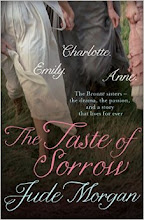In writing about Carson McCullers last week, I was reminded how immediately she can draw the reader into her books, and this got me to thinking about other great beginnings. Here, in no particular order, are three I love:
[1] The Crimson Petal and the White by Michel Faber
Watch your step. Keep your wits about you; you will need them. This city I am bringing you to is vast and intricate, and you have not been here before. You may imagine, from other stories you've read, that you know it well, but those stories flattered you, welcoming you as a friend, treating you as if you belonged. The truth is that you are an alien from another time and place altogether.
Direct address works so well here, as our un-named guide pulls us through the back alleys of Victorian London. She flits before us, explaining the streets, the houses, the characters, before plonking us headlong in the middle of the story. I could eat this book.
[2] Angel by Elizabeth Taylor
"'into the vast vacuity of the empyrean,'" Miss Dawson read. "And can you tell me what 'empyrean' means?"
"It means," Angel said. Her tongue moistened her lips. She glanced out of the classroom window at the sky beyond the bare trees. "It means 'the highest heavens'."
"Yes, the sky," Miss Dawson said suspiciously. She handed the exercise book to Angel, feeling baffled. The girl had a great reputation as a liar and when this strange essay had been handed in - "A Storm at Sea" - Miss Dawson had gone through it in a state of alarm, fearful lest she had read it before or ought to have read it before. She had spent an agitated evening scanning Pater and Ruskin and others. Though disdaining such ornamental prose, such crescendoes and alliterations, before she would say that the piece was vulgarly over-written, she hoped to find out who had written it.
So begins the tale of one of the most unlikeable heroines in literature. For which very reason, I adore her. She did write the essay, and the teacher's reaction to it is incredibly interesting, even - perhaps especially - today, when there are so many novels being published; how many times have we read something and been unable to decide if we don't like it because it is intellectually over our heads, or if it is, in fact, just overwrought tosh? That the teacher cannot tell if this essay is awful, or Ruskin, says so much...
[3] Motherless Brooklyn by Jonathan Lethem
Context is everything. Dress me up and see. I'm a carnival barker, and auctioneer, a downtown performance artist, a speaker in tongues, a senator drunk on filibuster. I've got Tourette's. My mouth won't quit, though mostly I whisper or subvocalize like I'm reading aloud, my Adam's apple bobbing, jaw muscle beating like a miniature heart under my cheek, the noise suppressed, the words escaping silently, mere ghosts of themselves, husks empty of breath and tone...words rush out of the cornucopia of my brain to course over the surface of the world, tickling reality like fingers on piano keys. Caressing, nudging...Then when it comes, the urge to shout in the church, the nursery, the crowded movie house. It's an itch at first. Inconsequential. But that itch is soon a torrent behind a straining dam. Noah's flood. That itch is my whole life. Here it comes now. Cover your ears. Build an ark.
"Eat me!" I scream.
Lionel, believe it or not, is a private detective. And this is a very clever novel. The beat and pace builds and subsides with Lionel's attacks (tics as much as words) and the descriptions of how Tourette's feels from the inside are extraordinary. Lethem uses words not just as a way of furthering narrative, but also as characters, and even simply as noises. This is an unusual choice for me, but it's one I recommend investing in.
Subscribe to:
Post Comments (Atom)


No comments:
Post a Comment